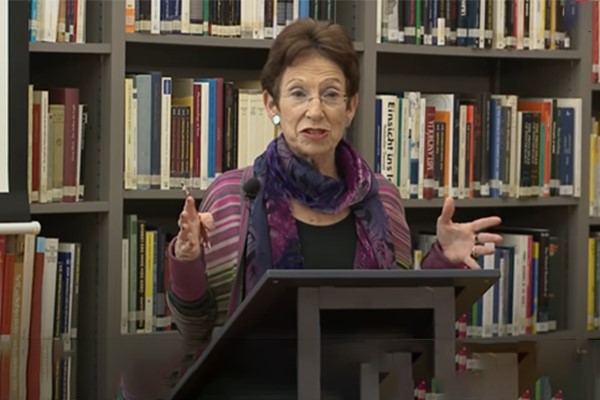From September 2018 to May 2019 and from February to September 2020, Ruth Wodak was a Senior Visiting Fellow at the IWM. During her fellowship she worked on the second, revised edition of her book “The Politics of Fear. The Shameless Normalization of Far-Right Discourse,” which was released by SAGE in December 2020. In January 2021, Ruth Wodak was awarded the Bruno Kreisky Prize 2021 for her Lifetime Achievements (publizistisches Gesamtwerk).

 Fear Eats the Soul
Fear Eats the Soul
A Commentary by Miloš Vec
There are several features I simply love in Ruth Wodak’s work. The recently issued second edition of The Politics of Fear. The Shameless Normalization of Far-Right Discourse (SAGE 2021) is a brilliant example of what I admire in her academic writing. Probably the most compelling quality for me is the engagement of its many theoretical discourses with practical evidence. All of her claims and theses are very clearly elaborated and then backed with rich, recent empirical evidence, including not only quotes from a vast variety of literary genres but also visual sources like posters, photographs, media screenshots, and cartoons. All this is supported by a typography and layout that make it extremely easy to follow the line of argumentation and the use of detailed examples. I cannot recall any other book from the field of discourse analysis that appealed as much to me in its style.
“Ali: Fear Eats the Soul” is the title of a famous 1974 West German movie by director Rainer Werner Fassbinder. Its original German title, “Angst essen Seele auf,” is linguistically clear about the modification of German grammar by a non-native speaker – the meaning intended would be expressed more correctly as “Die Angst isst die Seele auf.” This is important as the movie depicts an unhappy love affair between a young North African immigrant and a middle-aged German woman. The very unconventional couple is faced with overwhelming rejection and destructive hatred in 1970s Munich (the 1972 Munich Olympics massacre plays an explicit role with regard to the perception of Arabs). One can only imagine how Fassbinder, who died in 1982, would have perceived today’s political climate and the discourse about migration and migrants. Already the shift in which subject feels fear is striking. In Fassbinder’s movie it is the Arab migrant who formulates the iconic statement “Fear Eats the Soul” whereas today’s far-right politicians talk about the fears of the imagined community of “authentic” people – and keep quiet about those others who have experienced terrifying things.
Such fears, often with xenophobic and racist undercurrents, have many sources and multiple outcomes. As a jurist, I am particularly interested in the interfaces between social manners, religion, morality, and legal regulations. From the point of view of sociology of law, there are many possible interactions between those fields. “Multinormativity” is a potential theoretical frame for detailed investigations about conflicts, coexistence, and cooperation between different types of norms, and history gives abundant evidence about such complex relations. Furthermore, with its “emotional turn,” historiography has been given additional perspectives for a better understanding of the role of emotions in political developments. Clearly, “fear” is not only a topos in the classic writings of political theory but also leverage for political actors. In Wodak’s study, far-right populists transnationally try to use fears they are provoking for their agenda.
“The politics of fear” is rich with examples of how discourses not only mobilize imagined threats to initiate legislation but also legitimize attacks on existing institutions and the rule of law. The book’s main claim (and moral accusation) can be found in the titular phrase “shameless normalization”: a shift is taking place with the extremist tools, language, and political agenda of the far right moving from the periphery to the center, supported by mainstream conservative parties. Although these should be regarded as non-normal and unacceptable, they have become perceived as legitimate and reasonable in a number of laws, discourses, and regulatory fields, shifting the boundaries of normality and the unsayable.
A recurrent pattern of interaction seems to be that far-right politicians evoke dubious or even false images of externally located threats to specific parts of the population; the drawing of boundaries plays an essential role. If they are successful (and they often are), a “securitization” through state institutions takes place: new laws or rules emerge that promise to keep away those particular threats from the “authentic” people. However, it turns out very soon that the measures taken are often dysfunctional. Even more revealing, the legislative bodies and the administration often have no ambition to enforce them. In other words, they are “symbolic legislation,” a tool of political communication to disguise real and fallacious ambitions on many levels. Trying to make citizens believe that parliaments and elected politicians care about present challenges, they only simulate effective measures through laws that are dysfunctional (as the solution is not based on any substantive underlying problem analysis) and never enforced. This kind of legislation is only powerful as a message in political interaction.
For this kind of symbolic legislation, the shift through “shameless normalization” is very important. As legislation and administration restrict individual and collective liberties while promising to promote “security,” specific justifications are required for the “new normal” level of restrictions. Very often such justifications for trading liberty for security not only manipulate facts and causalities, but also cross borders in the discourse. Therefore, the interplay of morality, social conventions, and the law crosses lines dermarcating what has been before possible to say and what has not.
Wodak’s book frequently refers to the idea of “taboo” and its transgression in political communication. In the chapter on “Protecting Borders and the People: The Politics of Exclusion,” Wodak states that “shamelessness and shameless normalization become apparent when taboos in regard to conventional rules of politeness and respect are deliberately broken, when deliberative dialogue is rejected and the so-called ‘conversational’ maxims are flouted.” (p. 91) She then adds: “the shameless transgression of conventions and breaking of taboos has become acceptable and – indeed – normalized.” (p. 94)
Examples of such transgressions can be seen in the case of Austria in the calculated ambivalence of statements by Barbara Rosenkranz challenging the contemporary relevance of the Verbotsgesetz of 1947. What is being questioned is not only a legal codification but technically speaking the constitution that embodies Austria’s post-World War II identity as a democratic republic emerging from de-nazification, opposing any attempt to reestablish a fascist regime and thus banning accordingly certain types of political actions and speech. The idea of “political correctness” refers to moral standards in rhetorical conventions. It tells us who we are, and it is no coincidence that Wodak uses the term in a non-ironic manner. (p. 151) As she argues, it has increasingly gained a polemical dimension and is used to delegitimize efforts to maintain political language within a frame that is very often drawn from historic experiences of discrimination and persecution.
In all the fields of discourse about the national and historic identity of political entities such as states or municipalities, extremist offenses are deliberately committed and seek to normalize defamation and discrimination. Since the days of Fassbinder’s movie, the discourse on immigration has not lost its function as a reliable indicator of how civil standards can be trampled under foot by wealthy societies, and how individuals may harm particularly those who are already in a weak or even desperate economic, legal, or social position. Wodak seems to be not very optimistic about a potential positive role laws and courts could play to counter this. Analyzing one specific court case that ended with an acquittal, she concludes that “the lack of legal consequences seems to confirm that ‘anything goes’, another example of shameless normalization.” (p. 25) Even politicians of the Austrian Green party “who had always campaigned for human rights and liberal values, have now accepted far-right policies that they had previously vehemently opposed.” (p. 62) Thus, there is a lot of pressure and disappointingly little defense not only through but also of legal regulations and institutions against the attacks of extremists.
The attacks on the constitutional system of checks and balances imply that those, as well as (parts of) the press, are still bulwarks against the abolishment of liberal democracies and their values as embodied in fragile constitutions. Wodak’s emphasis on the mutual dependency between legal provisions and moral fundamentals or political manners underlines the need to protect also non-legal norms if we want to keep legal institutions working as intended. What is more, the enforcement of existing regulations against discrimination and hate speech has to be taken more seriously than ever. It should not be decisive how many convictions or acquittals are reached in trials dealing with cases of hate speech and discrimination – just the communication about existing legal prohibitions and their underlying values has impact.
However, it is important to bear in mind that all political actors try to mobilize legal procedures in favor of their political goals, that law can often communicate unintended messages, and that trials may have paradoxical consequences. These risks are also a result from the autonomy of law and contribute to its eminent functions in modern states. This might be a slightly unsatisfactory insight, but we have to be aware that even polemical discourses and legal battles over the legitimacy of such attacks contribute in very tricky ways to a working democracy.
Miloš Vec was IWM Permanent Fellow (2016-2020) and is Professor of Legal History at the University of Vienna.
Related Links
Academic and press articles
- Shamelessly normalizing big lies and alternative facts
Social Science Space, 14.01.21 - Joe Biden’s election offers lessons on Europe on how to deal with far-right populism
Euronews – View, 21.11.20 - COVID denial sunk Trump, but smarter right-wing populists are thriving
Newsweek – Opinion, 17.11.20 - Retro-Normale Zukunft: Die schrittweise Aushöhlung pluralistischer Demokratien
IWMpost 126, 15.11.20
Talks / Speeches
- “’Fortress Europe’? A Politics of Shameless Normalization”, Centre of Discourse Studies, 11.12.20
- (Re-)nationalizing Europe: The Austrian case 1995-2015, IST Science and Society Lecture, 19.11.20
- „Geht’s den Frauen gut, geht’s uns allen gut!“ Dankesrede anlässlich der Verleihung des Lebenwerk-Preises 2018 des Frauenministeriums an Ruth Wodak, 8.10.18
- On Trump and the politics of fear, Full Circle Brussels, 25.4.18
Interviews, op-eds, and podcasts
- Wie Corona die Sprache verändert / Freitesten, Lockdown, 7-Tages-Inzidenz: Sprechen Sie Corona?
KURIER, 15.1.21 - Ruth Wodak über Politik mit der Angst
profil-History, 20.11.20 - Politik mit der Angst: Philipp Blom im Gespräch mit Ruth Wodak
Bruno Kreisky Forum für Internationalen Dialog, 19.11.20 - Ars Boni 77: Die Sprache In Covid-19 (Ruth Wodak)
Idunivienna, November 2020 - Podcast Episode 36, frauenfunk.at
- Sprachwissenschaftlerin Wodak: „Von Hoffnung wenig zu spüren“
Wiener Zeitung 26.09.20 - Die Politik mit der Angst: Eine Gefahr für Österreich?
news.at, 25.9.20 - „It is important not to ‘react’ all the time”
neweuropeans.net, 13.9.20 - Rechtspopulismus: Schamlosigkeit verstehen und bekämpfen, Ruth Wodak im Gespräch mit Sabine Schatz
Wissenschaft und Politik, Der Wissenschaftsblog des Karl-Renner-Instituts, 14.2.20 - „Wir leben im Zeitalter der Schamlosigkeit“. Sprachforscherin Ruth Wodak über Antisemitismus von Waldheim bis Liederbuch-Affaire
Profil, 17.2.18